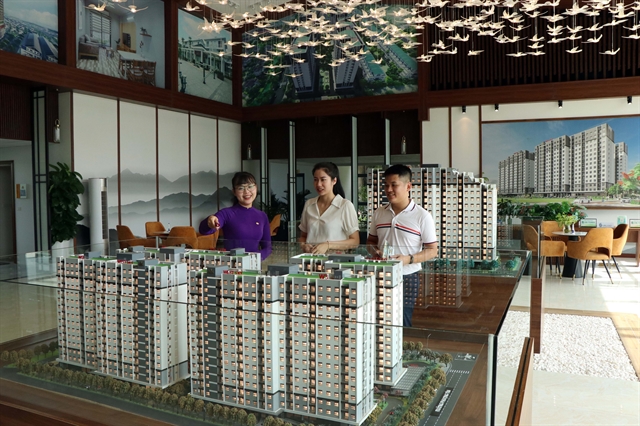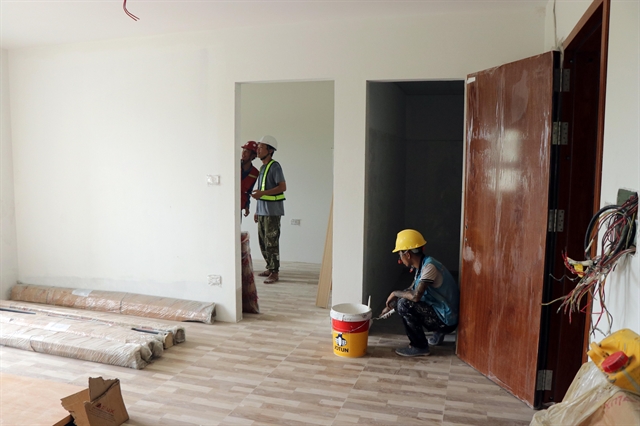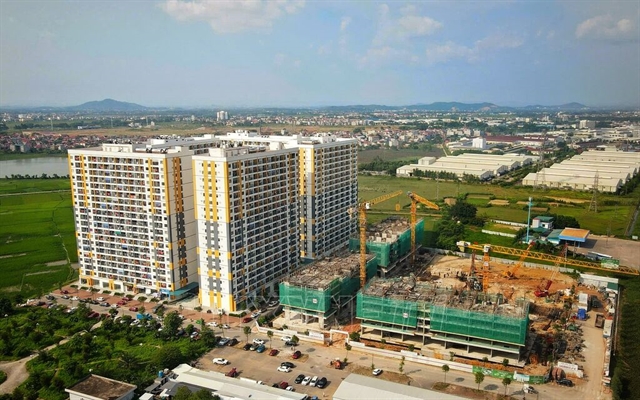 Society
Society

 |
| Customers view the model of a social housing development project in An Vân Dương New Urban Area in Huế City. — VNA/VNS Photo Đỗ Trưởng |
HÀ NỘI — Social housing development for low-income and industrial park workers have been identified as one of the key solutions to achieve social equity and sustainable development goals.
But amid stagnant implementation, experts have called on stronger measures alongside administrative reforms to achieve the national housing targets.
Housing is not merely a property but also a right, recognised by both international and Vietnamese laws, according to Dr Nguyễn Sĩ Dũng, former deputy head of the National Assembly (NA) Office.
Social housing, therefore, is part of the welfare policies that respond to citizens’ essential needs while also contributing to national growth.
However, the implementation process remains challenging, with millions of workers in major cities and industrial hubs in Hà Nội, HCM City, Bình Dương and Đồng Nai struggling to access affordable housing.
With average monthly incomes ranging from VNĐ10-13 million (US$385-500) per person, and mid- to high-end residence priced at VNĐ30-50 million ($1,150-1,915) per square meter, home ownership is out of reach for many.
Estimates suggest only around 10 per cent of average workers and civil servants in urban areas can afford housing.
In response, numerous policies have been introduced by the Party and the State. Notably, the NA passed Resolution No 201/2025/QH15 on piloting special mechanisms and policies for social housing development on May 29 this year.
On February 27, Prime Minister Phạm Minh Chính issued a decision assigning specific social housing targets for 2025 and subsequent years through 2030.
In addition to law revisions, administrative procedures have also been simplified to facilitate housing projects.
Localities are tasked with delivering approximately one million social housing units between 2021 and 2030 for low-income earners and industrial park workers. Achieving this policy goal requires both local effort and central support.
Deputy Minister of Construction Nguyễn Văn Sinh stated that nearly 690 social housing projects have been deployed across the country, accommodating around 630,000 units in total.
In the first five months of 2025 alone, 159 social housing projects of more than 135,000 units were being built. During the same period, over 22,500 units were completed.
 |
| A social housing unit under construction in the B Zone of An Vân Dương New Urban Area in Huế City. —VNA/VNS Photo Đỗ Trưởng |
Reducing red tape
Despite the positive initial statistics, significant challenges remain in social housing development. Many localities do not make this mission a priority in their socio-economic planning or form a dedicated steering committee to ensure progress.
Although land resources have been allocated to social housing development, many are located far from the municipal centres or lack the necessary infrastructure. Meanwhile, slow land clearance also affects timelines.
Bureaucratic hurdles remain in both commercial and social housing projects, from project approval, investor selection, to price setting and beneficiary identification.
In this context, the NA’s recently approved Resolution 201 was considered a major step forward in addressing obstacles in the actual implementation of social housing projects.
Some of the notable policies in the document include establishing a National Housing Fund; streamlining investment, construction and plan approval procedures; outlining pricing and eligibility criteria; and detailing compensation, resettlement and infrastructure regulations for land assigned to social housing projects.
The National Housing Fund is defined as a nonprofit financial fund excluded from the State budget to finance social housing construction and its related infrastructure for civil servants and workers.
Administrative procedures are shifting to focus more on post-implementation review of projects, reducing processing time in line with the Politburo’s Resolution No 68-NQ/TW dated May 4, 2025.
Accordingly, no investor bidding is required, equivalent to 200 working days saved. The document also stipulates no detailed plan creation, review and approval (65 days), no pre-feasibility report appraisal by specialised construction agency (15-35 days), no construction permit required for projects that apply standard or typical designs (20-30 days), no requirement for appraisal of sale and lease-purchase prices of social housing by specialised provincial-level agencies (30 days), and using streamlined contractor appointment process (equivalent to 45-105 days).
Under the resolution, which went into effect on June 1, people affected by administrative restructuring can be eligible for social housing support. State-owned enterprises and agencies can also rent social housing for their staff.
Bắc Giang case study
With one of the fastest-growing numbers of industrial zones, the northern province of Bắc Giang has achieved substantial results in developing social housing for low-income earners and industrial workers.
The province has launched around 14 social housing projects, equivalent to about 29,000 housing units.
 |
| The social housing project Evergreen in Bắc Giang Province is located among the province’s major industrial parks. — VNA/VNS Photo Danh Lam |
A typical 33sq.m unit here costs about VNĐ370 million ($14,200). The homeowner only needs to pay VNĐ100 million upfront, while the rest was financed through the Việt Nam Bank for Social Policies with a 24-year loan at a monthly interest payment of VNĐ1 million ($40).
A larger 57sq.m unit with two bathrooms costs VNĐ670 million ($25,700) with an initial deposit of VNĐ200 million. For such households, the monthly payment amounts to VNĐ2.2 million for 25 years.
Phạm Văn Thịnh, vice chairman of Bắc Giang People’s Committee said: “Many [workers] said it seemed like a dream to come to Bắc Giang as factory workers and, in such a short time, being able to own a home.
“They now feel secure, and there are even kindergartens nearby for their children.”
Bắc Giang has set a target of building about 70,000 social housing units, with an estimated investment of around VNĐ110 trillion ($4.22 billion) for the 2021-30 period.
The province seeks to utilise local labour, materials, and manpower for this goal, which carries more significance than other projects of similar scale.
Thịnh added: “Bắc Giang considers workers a crucial resource for the province’s development, both now and in the future. Therefore, caring for workers is not only a responsibility but also an economic development strategy.”
Local authorities view every social housing project as a comprehensive, sustainable socio-economic development project, he explained.
This vision is translated into concrete action plans. In 2024 alone, the province designated over 200ha of land for over 70,000 social housing units.
With the progressive Resolution 201, Bắc Giang plans to complete the selection of 15 investors for 30,000 units by July, while investors for the remaining units will be completed in the first quarter of 2026.
“The most important factor is the awareness and commitment of local leaders, in combination with concrete measures and implementation plans," Thịnh said.
“These ensure the full mobilisation of the political system and tie project outcomes to the accountability of the local leadership, particularly in land clearance and infrastructure development around social housing areas, to ensure synchronised project completion.”
In line with this awareness, Bắc Giang authorities established a support task force for social housing projects, led by a provincial People’s Committee vice chairman, which holds monthly meetings to promptly resolve any bottleneck that arises.
Thịnh also underlined the importance of selecting financially capable investors to ensure progress: “Despite the large scale of our programme, our selected developers have not needed to borrow from banks and use their own capital.
“We also streamline procedures so that by the time a building reaches the third or fourth floor, units can be opened for sale.”
The province also puts in place administrative measures to expedite progress. In that case, if developers fall behind schedule, they might be replaced them to keep the projects on track.
Sharing the same perspective with Bắc Giang authorities on the significance of social housing development, former deputy head of the National Assembly (NA) Office, Dũng, stressed that this mission is not charity work – it is a mandate from the Party and the State to ensure social equity.
“Providing social housing and securing employment for workers is not an economic burden, it is an opportunity for economic growth,” said Dũng. — VNS




